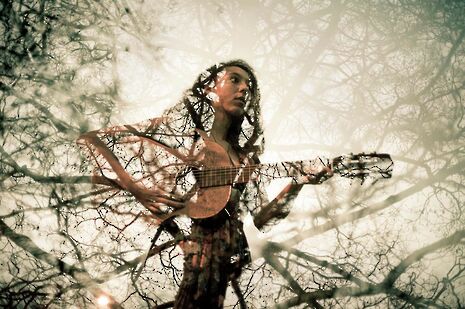Varsity Introducing: Rrose Sélavy
The third-year MML student (real name Jade Cuttle) has sung on BBC Radio, drawing inspiration from the modernist French paper she studied last year.

Can you explain your pseudonym Rrose Sélavy? What does it mean?
When writing my dissertation on Surrealism last year I stumbled across a Robert Desnos poem called ‘Rrose Sélavy etc’. It is a made-up French name which is a pun that can be pronounced in different ways to give different meanings. It sounds like “Eros, c’est la vie” but could also be “Rrose sait la vie”. Though the name is unique, ironically I keep having to type the word ‘cliché’ into Word so I can access the ‘é’ accent.
How would you describe your music?
Poetic-folk, an artistic experiment which translates poetry into musical performance. I aim to explore how our human world weaves into the natural one. For example, I sing about a shard of ice lodged in the crack of a mountainside wishing it was as free as the sea, lamenting that the sky spat it out and will not take it back.
Your songs are also heavily influenced by the modernist French paper you studied in second-year, which includes writers like Samuel Beckett and New Wave cinema.
That’s right. I wrote a song inspired by Agnès Varda’s film La Pointe Courte which we studied last year. In one scene the slats of a rotting ship seem to reflect the internal landscape of two characters. One can imagine the rib-like ship as the chest of the couple whose love has turned stale. It’s like they’re perched inside their own rotting ribcage, unable to escape their emptiness.
Was it difficult to balance work with making music last year?
I wrote the song during the solitary confinement stage of the dissertation deadline, barely leaving my room for the first week of Lent. I lived on tins and nearly went insane but at least the dissertation went well! On another dissertation deadline I attempted to artistically turn all the furniture in my room upside down. It didn’t quite work.
Do you find that being at Cambridge is a help or a hindrance to your creativity?
It certainly impacts my drafting process. Last year, on my bike rides through pretty meadows and a herd of cows heading to lectures from Homerton, I’d make syllabic adjustments to songs, almost always out loud.
I wonder if there’s a surrealist element to the way you structure or perform your songs. I’ve heard of surrealist painters and poets but not singers…
When I started writing I began playing with expectations and testing the limits of traditional songwriting, creating chaos within the constraints by using a mathematically jarring number of lines. I also use an extended poetic-melodic narrative structure that does away with choruses, allowing the song to take charge of itself.
You’ve got rid of choruses?
Perhaps I see creativity as a power struggle… Ultimately it’s a power struggle against myself. If we question the creative laws we become less subservient as songwriters. I questioned the place of choruses and more often than not found them unconvincing so I ditched them after my debut EP I Am Like The Tree.
So how did your music come to be played on BBC Radio?
It was after winning the BBC Proms Poetry Competition, where I was interviewed on Radio 3. I’d written a poem called The Art of Splinters which was inspired by Bach’s St John Passion. After that, I started translating poems into songs which led to BBC Introducing inviting me to play a live session. My next BBC Introducing session, with more of a focus on poetry, is in January.
You played at Homerton May Ball last year and warmed up for Stephen Fry at the Sidney Arts Festival. When can we next see you live in Cambridge?
I’m currently on my year abroad, studying in Paris, but I’ll be back for the Girton Spring Ball and hopefully a May Ball or two in the summer!
 News / Fitz students face ‘massive invasion of privacy’ over messy rooms23 April 2024
News / Fitz students face ‘massive invasion of privacy’ over messy rooms23 April 2024 News / Cambridge University disables comments following Passover post backlash 24 April 2024
News / Cambridge University disables comments following Passover post backlash 24 April 2024 Comment / Gown vs town? Local investment plans must remember Cambridge is not just a university24 April 2024
Comment / Gown vs town? Local investment plans must remember Cambridge is not just a university24 April 2024 Comment / Does Lucy Cavendish need a billionaire bailout?22 April 2024
Comment / Does Lucy Cavendish need a billionaire bailout?22 April 2024 Interviews / Gender Agenda on building feminist solidarity in Cambridge24 April 2024
Interviews / Gender Agenda on building feminist solidarity in Cambridge24 April 2024





